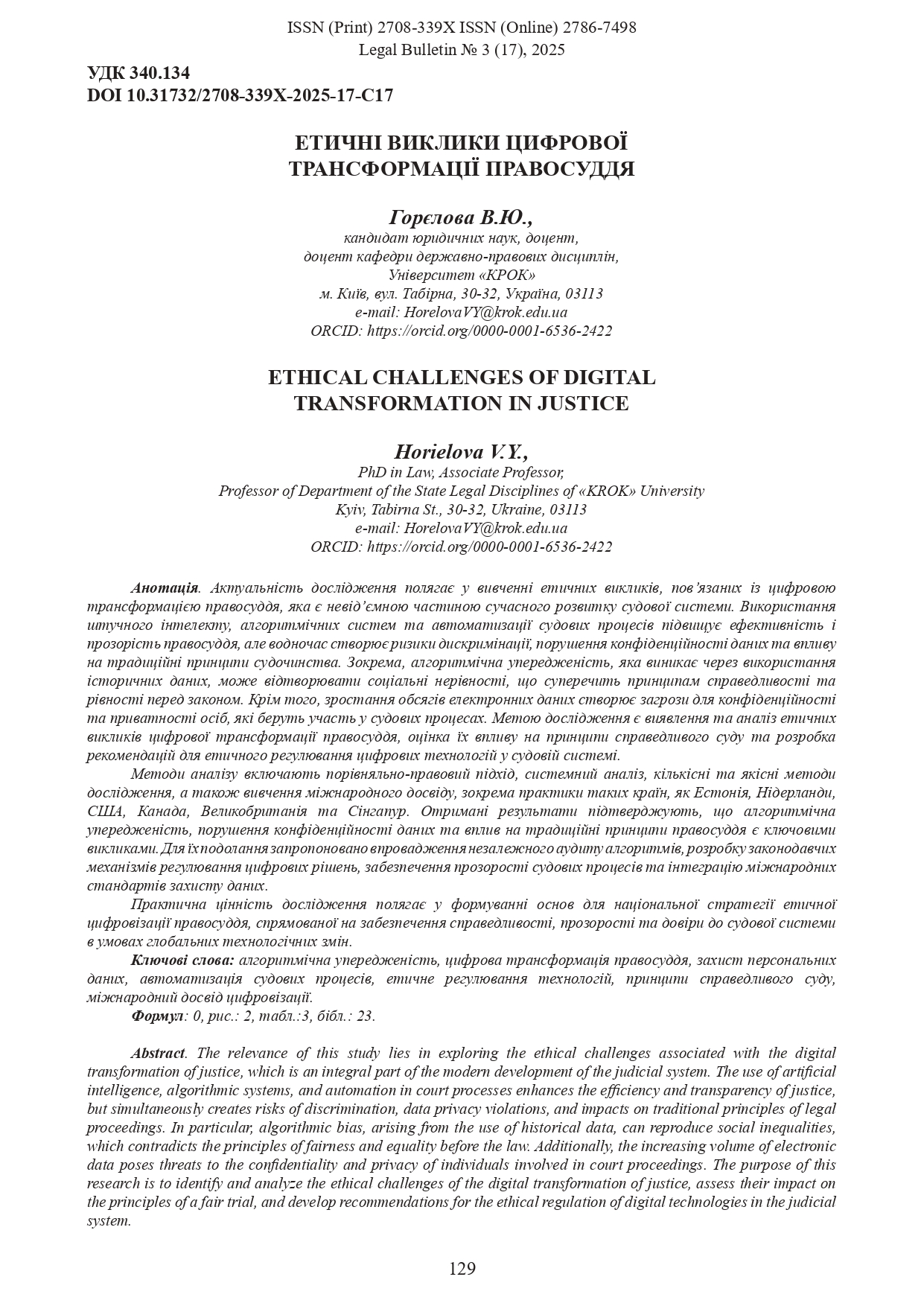ЕТИЧНІ ВИКЛИКИ ЦИФРОВОЇ ТРАНСФОРМАЦІЇ ПРАВОСУДДЯ
DOI:
https://doi.org/10.31732/2708-339X-2025-17-C17Ключові слова:
: алгоритмічна упередженість, цифрова трансформація правосуддя, захист персональних даних, автоматизація судових процесів, етичне регулювання технологій, принципи справедливого суду, міжнародний досвід цифровізаціїАнотація
Актуальність дослідження полягає у вивченні етичних викликів, пов’язаних із цифровою трансформацією правосуддя, яка є невід’ємною частиною сучасного розвитку судової системи. Використання штучного інтелекту, алгоритмічних систем та автоматизації судових процесів підвищує ефективність і прозорість правосуддя, але водночас створює ризики дискримінації, порушення конфіденційності даних та впливу на традиційні принципи судочинства. Зокрема, алгоритмічна упередженість, яка виникає через використання історичних даних, може відтворювати соціальні нерівності, що суперечить принципам справедливості та рівності перед законом. Крім того, зростання обсягів електронних даних створює загрози для конфіденційності та приватності осіб, які беруть участь у судових процесах. Метою дослідження є виявлення та аналіз етичних викликів цифрової трансформації правосуддя, оцінка їх впливу на принципи справедливого суду та розробка рекомендацій для етичного регулювання цифрових технологій у судовій системі. Методи аналізу включають порівняльно-правовий підхід, системний аналіз, кількісні та якісні методи дослідження, а також вивчення міжнародного досвіду, зокрема практики таких країн, як Естонія, Нідерланди, США, Канада, Великобританія та Сінгапур. Отримані результати підтверджують, що алгоритмічна упередженість, порушення конфіденційності даних та вплив на традиційні принципи правосуддя є ключовими викликами. Для їх подолання запропоновано впровадження незалежного аудиту алгоритмів, розробку законодавчих механізмів регулювання цифрових рішень, забезпечення прозорості судових процесів та інтеграцію міжнародних стандартів захисту даних. Практична цінність дослідження полягає у формуванні основ для національної стратегії етичної цифровізації правосуддя, спрямованої на забезпечення справедливості, прозорості та довіри до судової системи в умовах глобальних технологічних змін.
Посилання
Engvin D., Larson D., Mattu S., Kirchner L. Mashynna uperezhzenist. ProPublica. 2016. URL: https://www. propublica.org/article/machine-bias-risk-assessments-in-criminal-sentencing (accessed: 06.07.2025).
Shtuchnyy intelekt v ES i Velykiy Brytaniyi: porivnyannya rehulyatornykh pidhodiv. Dnistryanskyy tsentr. 2023. URL: https://dc.org.ua/news/shtuchnyy-intelekt-v-es-i-brytaniyi-porivnyannya-regulyatornyh-pidhodiv (accessed: 06.07.2025).
Basiuk O. P. Rekomendatsiyi shchodo vprovadzhennya tekhnolohiy rozpodilenoho reyestru (blokcheyn) u derzhavnomu sektori Ukrayiny na osnovi svitovoho dosvidu. Aktualni problemy derzhavnoho upravlinnya. 2023. № 1. P. 131–154. DOI: 10.26565/1684-8489-2023-1-08. DOI: https://doi.org/10.26565/1684-8489-2023-1-08
Bielov D. M., Bielova M. V. Shtuchnyy intelekt u sudovomu protsesi ta sudovykh rishennyakh: potentsial i ryzyky. Uzhhorodskyy natsionalnyy universytet. 2023. URL: https://www.researchgate.net/publication/373627051_Artificial_ intelligence_in_judicial_proceedings_and_court_decisions_potential_and_risks/fulltext/64f34ba3827074313ff23093/
Artificial-intelligence-in-judicial-proceedings-and-court-decisions-potential-and-risks.pdf (accessed: 06.07.2025).
Buolamwini J., Gebru T. Genderni vidtinky: mizhsektoralni vidminnosti v tochnosti komertsiyinykh system klasyfikatsiyi za statyu. Pratsi konferentsiyi z mashynnoho navchannya. 2018. Vol. 81. P. 1–15. URL: http://proceedings. mlr.press/v81/buolamwini18a.html (accessed: 06.07.2025).
Artificial intelligence for higher education: benefits and challenges. Frontiers in Education. 2024. URL: https:// www.frontiersin.org/journals/education/articles/10.3389/feduc.2024.1501819/full (accessed: 06.07.2025).
Tsyfrova derzhava: alhorytm uspikhu vid Singapuru. UASpectr. 2020. URL: https://uaspectr.com/2020/12/21/ algorytm-uspihu-vid-singapuru/ (accessed: 06.07.2025).
Yevropeyska komisya z efektyvnosti pravosuddya (CEPEJ). Etychna khartiya shchodo vykorystannya shtuchnoho intelektu v sudovykh systemakh. 2018. URL: https://www.coe.int/en/web/cepej/ethical-charter (accessed: 06.07.2025).
Bilʹshe 12 000 osib buly profilʹovani defektnym instrumentom prohnozuvannya politsiyi Darema. Fair Trials.
predictive-ai-tool/ (accessed: 06.07.2025).
Zahalʹnyy rehulyament zakhystu danykh (GDPR). Yevropeysʹkyy parlament i Rada. 2016. URL: https://eur-lex. europa.eu/legal-content/EN/TXT/?uri=celex%3A32016R0679 (accessed: 06.07.2025).
Holovatsʹkyy N. T. Pravove rehulyuvannya zakhystu personalʹnykh danykh: GDPR ta ukrayinsʹke zakonodavstvo. Visnyk yurydychnoho fakultetu Uzhhorodsʹkoho natsionalʹnoho universytetu. 2024. № 44. P. 1–10. URL: https://visnyk-juris-uzhnu.com/wp-content/uploads/2024/11/44-1.pdf (accessed: 06.07.2025).
Mizhnarodnyy dosvid vykorystannya tsyfrovoyi informatsiyi v kryminalʹnomu protsesi. Journal of Legal Studies. 2019. № 4. URL: http://www.lsej.org.ua/4_2019/61.pdf (accessed: 06.07.2025).
Kovalʹchuk O. Ya. Pravovi ramky zastosuvannya shtuchnoho intelektu v sudoviy systemi. Internauka. URL: https://www.inter-nauka.com/uploads/public/17179636116454.pdf (accessed: 06.07.2025).
Larson D., Engvin D., Mattu S., Kirchner L. Alhorytmichni otsinky ryzyku u kryminalʹniy yustytsiyi: uroky z debativ navkolo COMPAS. Harvard Data Science Review. 2022. Vol. 4. № 3. P. 1–25. DOI: 10.1162/99608f92.1e2b3a1a. 15.Obermeyer Z., Powers B., Fogeli K., Mullainathan S. Analiz rasovoyi uperezhzenosti v alhorytmi, shcho vykorystovuyetsya dlya upravlinnya zdorovyam naselennya. Science. 2019. Vol. 366. № 6464. P. 447–453. URL: https:// DOI: https://doi.org/10.1126/science.aax2342
science.sciencemag.org/content/366/6464/447 (accessed: 06.07.2025).
Ocheretyanyy V. V., Osisky Y. O. Tsyfrova transformatsiya sudovykh posluh v Ukrayini: dosyahnennya ta perspektyvy. Vinnytsʹkyy navchalʹno-naukovyy instytut ekonomiky Zakhidnoukrayinsʹkoho natsionalʹnoho universytetu. 2024. URL: http://www.lsej.org.ua/4_2024/162.pdf (accessed: 06.07.2025).
Paskar A. Etychni aspekty vykorystannya shtuchnoho intelektu v pravosuddi: shlyakh do zabezpechennya prav lyudyny. Naukovyy zhurnal Chernivetsʹkoho natsionalʹnoho universytetu imeni Yuriya Fedʹkovycha. 2023. URL: https:// journals.chnu.chernivtsi.ua/index.php/main/article/download/70/52/103 (accessed: 06.07.2025).
Petryshyn O. V., Hilyaka O. S. Prava lyudyny u tsyfrovu epokhu: vyklyky, zahrozy ta perspektyvy. Visnyk Natsionalʹnoyi akademiyi pravovykh nauk Ukrayiny. 2021. Vol. 28. № 1. P. 7–35.
Bernazyuk Ya. Tsyfrova era pravosuddya: rolʹ shtuchnoho intelektu u zabezpechenni yednosti sudovoyi praktyky v Ukrayini. Protocol. 2023. URL: https://protocol.ua/ru/tsifrova_era_pravosuddya_rol_shi_u_zabezpechenni_ ednosti_sudovoi_praktiki_v_ukraini/ (accessed: 06.07.2025).
Bilyy dim vyrobyv rekomendatsiyi shchodo zakhystu hromadyan vid shtuchnoho intelektu. MediaSapiens.
URL: https://ms.detector.media/trendi/post/30381/2022-10-04-bilyy-dim-vyrobyv-rekomendatsii-shchodo-
zakhystu-gromadyan-vid-shtuchnogo-intelektu/ (accessed: 06.07.2025).
Tlyopova-Demura M. Vykorystannya alhorytmiv shtuchnoho intelektu u kryminalʹniy yustytsiyi: mizhnarodnyy dosvid ta vitchyznyani perspektyvy. 2021. URL: https://www.academia.edu/80992767/ (accessed: 06.07.2025).
Zgama A. O. Tsyfrova transformatsiya pravosuddya ta perspektyvy dlya biznesu. Analitychna ta porivnyalʹna yurysprudentsiya. 2024. № 320. P. 320–325.
Zyuderven Borgezius F. Y. Dyskryminatsiya, shtuchnyy intelekt i alhorytmichne pryyattya rishenʹ. Rada Yevropy. 2018. URL: https://rm.coe.int/discrimination-artificial-intelligence-and-algorithmic-decision-making/1680925d73 (accessed: 06.07.2025).

Downloads
Опубліковано
Як цитувати
Номер
Розділ
Ліцензія
Авторське право (c) 2025 Горєлова В.Ю.

Ця робота ліцензується відповідно до Creative Commons Attribution 4.0 International License.




